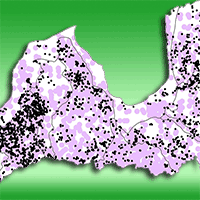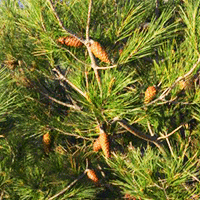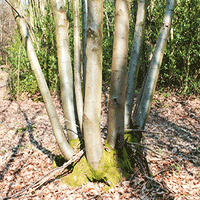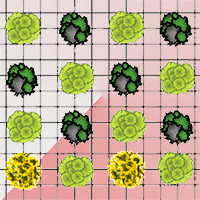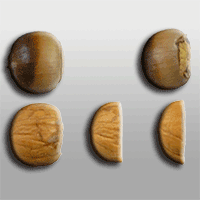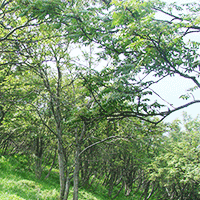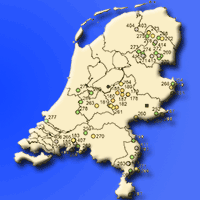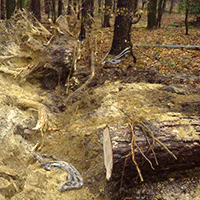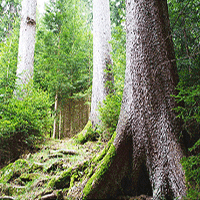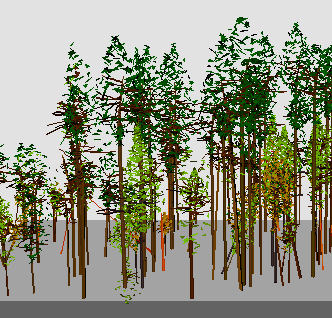
Naturally regenerated English oak (Quercus robur L.) stands on abandoned agricultural lands in Rilate valley (Piedmont Region, NW Italy)
iForest - Biogeosciences and Forestry, Volume 4, Issue 1, Pages 31-37 (2011)
doi: https://doi.org/10.3832/ifor0560-004
Published: Jan 27, 2011 - Copyright © 2011 SISEF
Research Articles
Abstract
The present study was carried out in 14 sites located in Rilate valley, a hilly area in the south-east Piedmont (NW Italy) within the Monferrato district. Sites were selected where naturally regenerated forest communities are developing on abandoned crop lands. Altitude ranges from 190 to 240 m a.s.l., while the abandonment period varied from 1 to 50 years at the time of the surveys (year 2007). The presence of younger stands (i.e., stands with age < 12 yrs) demonstrates a rapid invasion of abandoned farmlands by forest communities dominated by English oak mixed with other hardwoods, such as wild cherry and common elm. Observations conducted in older stands (i.e., stands with age ranging between 20 and 50 yrs) confirm the ability of English oak to generate well structured woodlands in the study area. In these environmental conditions previous cropping and exposure seem to play a significant influence on stand characteristics. Other noble hardwoods, such as wild cherry and common elm, are frequently associated with the oak. These stands showed a mean annual increment varying from 4 to 6 m3 ha-1 year-1 at the age of 45-50 yrs. At the present, black locust is only sporadic in the uppermost canopy layer and generally confined in the understory. The rapid colonization by Q. robur is favoured by the presence of adult oak trees in the field edges, providing abundant acorns efficiently dispersed by small rodents and birds. Oak stands observed in this study are worthy of notice in the light of the current decline of many adult oak communities in northern Italy, as well as for their potential to produce lumber and veneer logs. Therefore, these stands should be preserved avoiding coppicing or other irrational cuts. Further studies would be needed to analyze the contribution of soil characteristics to the colonization processes.
Keywords
Quercus robur, Abandoned croplands, Oak stands, Piedmont, Rilate valley
Authors’ Info
Authors’ address
D Degioanni
Dept. AgroSelviTer, University of Turin, v. Leonardo da Vinci 44, I-10095 Grugliasco (TO - Italy)
Corresponding author
Paper Info
Citation
Minotta G, Degioanni D (2011). Naturally regenerated English oak (Quercus robur L.) stands on abandoned agricultural lands in Rilate valley (Piedmont Region, NW Italy). iForest 4: 31-37. - doi: 10.3832/ifor0560-004
Paper history
Received: Apr 23, 2010
Accepted: Dec 12, 2010
First online: Jan 27, 2011
Publication Date: Jan 27, 2011
Publication Time: 1.53 months
Copyright Information
© SISEF - The Italian Society of Silviculture and Forest Ecology 2011
Open Access
This article is distributed under the terms of the Creative Commons Attribution-Non Commercial 4.0 International (https://creativecommons.org/licenses/by-nc/4.0/), which permits unrestricted use, distribution, and reproduction in any medium, provided you give appropriate credit to the original author(s) and the source, provide a link to the Creative Commons license, and indicate if changes were made.
Web Metrics
Breakdown by View Type
Article Usage
Total Article Views: 57476
(from publication date up to now)
Breakdown by View Type
HTML Page Views: 48563
Abstract Page Views: 3499
PDF Downloads: 3949
Citation/Reference Downloads: 23
XML Downloads: 1442
Web Metrics
Days since publication: 5441
Overall contacts: 57476
Avg. contacts per week: 73.94
Citation Metrics
Article Citations
Article citations are based on data periodically collected from the Clarivate Web of Science web site
(last update: Mar 2025)
Total number of cites (since 2011): 5
Average cites per year: 0.33
Publication Metrics
by Dimensions ©
Articles citing this article
List of the papers citing this article based on CrossRef Cited-by.
References
Soil and land qualities influence forest decline in the Venetian plain (NE Italy). In: “Proceedings of the air water and soil quality international congress” (Manos Dassenakis A, Pattee E, Vianello G, Vittori Antisari L eds). Imola (Italy) 24-25 June 2009, vol. 3, pp. 175-182.
Gscholar
Energy forestry with willows and poplars - yields and nutrient supply. Pflanzenbauwissenschaften 12: 78-85.
Gscholar
Inventario forestale nazionale italiano. Tavole di cubatura a doppia entrata. Ministero dell’Agricoltura e delle Foreste, Istituto Sperimentale per l’Assestamento Forestale e per l’Alpicoltura, Trento (Italy), pp. 114.
Gscholar
I mammiferi delle aree protette astigiane: inventario e caratterizzazione ecologica preliminare. Quaderno n° 2, Ente dei Parchi e delle Riserve Astigiani, pp. 32.
Gscholar
Jays, mice and oaks: predation and dispersal of Quercus robur and Q. petraea in north-western Europe. In: “Seed fate: predation, dispersal and seedling establishment” (Forget PM, Lambert JE, Hulme PE, Vander Wall SB eds). CABI publishing, Wallingford, MI, USA, pp. 223-240.
Gscholar
Boschi di neoformazione: un caso nelle Prealpi venete. Sherwood-Foreste ed alberi oggi 3: 13-17.
Gscholar
Le dinamiche del paesaggio forestale: evoluzione temporale del bosco di neoformazione sui pascoli di Corte Pogallo - Parco nazionale della Val Grande (VB). Forest@ 3: 213-221. - doi: 10.3832/ efor0359-0030213.
Gscholar
Rimboschimento spontaneo di coltivi abbandonati nelle Alpi orobiche. Atti del II Congresso S.I.S.E.F.: “Applicazioni e Prospettive per la Ricerca Forestale Italiana” (Bucci G, Minotta G, Borghetti M eds). Ed. Avenue media, Bologna (Italy), pp. 23-26.
Gscholar
Mammal fauna in a young reclaimed area in the Rhineland lignite region. Zeitschrift für Angewandte Zoologie 75: 421-427.
Gscholar
Research on forest vegetation naturally regenerated on abandoned agricultural, vine growing, orchard and pasture lands in the Amance-Apance region (Haute-Marne County, France). Revista Padurilor 116: 19-26.
Gscholar
Spontaneous afforestation of fallows in Italy. NEWFOR - New forests for Europe: Afforestation at the turn of the Century. EFI Proceedings 35: 151-163.
Gscholar
Analisi strutturale ed evolutiva in acero-frassineti di neoformazione delle valli di Lanzo (TO). Monti e Boschi 5: 34-40.
Gscholar
Differences in composition of endophytic mycobiota in twigs and leaves of healthy and declining Quercus species in Italy. Forest Pathology 33: 31-38. - doi: 10.1046/ j.1439-0329.2003.3062003.x.
Gscholar
Vegetazione forestale ed insediamento del bosco in campi abbandonati in un settore delle Prealpi Giulie (Taipana-Udine). Gortania 9: 83-144.
Gscholar

